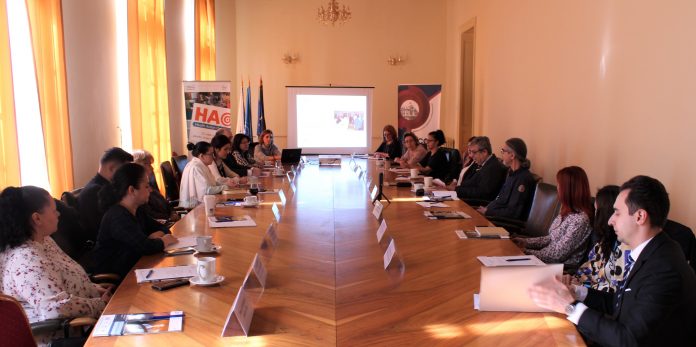In mid-April, Health Action Overseas Romania Foundation (HAO) organised at the Palace of Bucharest Chamber of Commerce and Industry the roundtable “Challenges and Perspectives on Supported Employment Services for People with Disabilities in Romania”. Representatives of public institutions engaged in disability policies, and of business organisations, public and private providers of educational, social and employment services, alongside human resources specialists from organisations and companies intereseted in assuring an inclusive work environmentattended the event.
“Experience shows that the Supported Employment model works regardless of the company’s size, the field of activity, or the disability of the beneficiary who we want to integrate. Only three elements matter: the young adult’s desire to work, the openness and availability of the employer, and the quality of the services offered by the specialists. We are here to discuss constructively about the issue of Supported Employment as a new service for people with disabilities, recognized by law, to understand each other’s point of view, and to identify thesteps to be taken so that these services become widely accessible”,said Nicolae Dobrescu, Executive Director of HAO and the manager of Labour market Employment for young Adults with a Disability project (LEAD).
“We do not seek to have as many beneficiaries as possible enrolled in the project. Instead, we work hard in order to have young adults who keep their jobs for a long time, who become well-integrated, and who live an independent life. At the same time, we develop long-term relationships, based on mutual respect with the employers we work with”, emphasized Nicolae Dobrescu.
Adela Crăciun, vice-president of National Authority for the Protection of the Rights of Persons with Disabilities, also spoke about the importance of mutually beneficial collaboration between all parties involved. “Imposing is not a solution. When we do that, we can not guarantee to our beneficiaries the quality and sustainability of the integration process on the labour market. Moreover, this approach will have a boomerang effect, hitting precisely the vulnerable groups, which we want to protect, and will contribute to the furtherance of discrimination”, underlined Adela Crăciun.
In her opinion, simple funding mechanisms, coherent public policies, focused on the importance of the social worker and the change of mentality regarding disability, including ones through such events, are needed. In context, Adela Crăciun pointed out that National Recovery and Resilience Plan could be a chance, because it includes financing options for employment and assistive technologies for vulnerable groups.
“I think that wide spread of the Supported Employment, a model based on a partnership strategy between the employee, the employer and the employment service provider, is a solution that must be seriously considered. However, I appreciate that better communication between the companies’ representatives and other social actors is needed. I am glad to say that the chambers of commerce could play an important role on this issue, given their permanent contact with their members, and the partnership system developed over time”, underlined Iuliu Stoklosa, president of Bucharest Chamber of Commerce and Industry.
“In my opinion, by supporting the local community and developing a socially responsible business, we will attract new customers/consumers, shareholders and investors, and we will improve our reputation in a sustainable way. So, I express my entire openness to promote success stories and good practices on the local business environment in order to strengthen the previous idea”, said Iuliu Stocklosa.
“The model of Supported Employment was created in the USA in the 70’s. It was imported into Europe, initially in the United Kingdom, and then it has expanded in other countries. In 2018, HAO started implementing such a model in Romania, within the LEAD project, with the support of Status Employment, the expert partner from United Kingdom. The Supported Employment model has caught on very well, and the figures confirm this statement: all assumed indicators have been exceeded by almost 100%. Also, in 2019, we established the National Network of Supported Employment Services Providers within the LEAD project, in order to facilitate the implementation of Supported Employment methodology throughout the country and to ensure the exchange of information between professionals in the field”, explained Alina Dobrescu, Coordinator of the Supported Employment Programme.
Within LEAD project, young people with disabilities benefit free of charge from: vocational profiling, counselling to develop self-confidence, preparing for a job in line with their professional training and interests, in-work and outside work support. Also, recruitment, pre-screening, training and support services at the workplace are provided free of charge for companies which use our Supported Employment program.Moreover, our specialists stay in touch with the employer in order to identify the problems which appear during the integration process and to solve them. Additionally, they work with the team members of whom the beneficiaries are part, in order to help them communicate effectively with them. Last but not least, our team provides comprehensive information regarding legal framework, tax facilities and benefits granted by the state to employers working with people with disabilities
The roundtable was organised within “Labour market Employment for young Adults with a Disability – LEAD” project, funded by Iceland, Liechtenstein and Norway through the EEA and Norway Grants Fund for Youth Employment.The project is addressed to: the young adults with disabilities; the parents and the relatives of young adults with disabilities; the companies; the specialists and the providers of Supported Employment services. LEAD project is implemented by Health Action Overseas Romania Foundation (HAO), as leading partner, alongside Valakupiai Rehabilitation Center (Lithuania), Consultis – Consultoria Empresarial, Unipessoal Lda. (Portugal), and Status Employment (United Kingdom).
Cristina ŞERBĂNESCU


